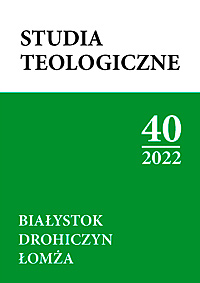Transcendencja osobowa – jako horyzont ujawniania i aktualizowania się ludzkiej emotywności
PERSONAL TRANSCENDENCE - AS THE HORIZON OF REVEALING AND ACTUALIZING HUMAN EMOTIVITY
(NOTES IN THE MARGIN OF “ADEQUATE ANTHROPOLOGY” BY KAROL WOJTYŁA)
Author(s): Piotr MrzygłódSubject(s): Philosophy
Published by: Kuria Metropolitalna Białostocka
Keywords: Karol Wojtyła; “adequate anthropology”; emotivity; transcendence; human act; human person; intellect; will; feelings; emotions; impressions
Summary/Abstract: Karol Wojtyła’s “adequate anthropology” [1920-2005] (conceived as a synthesis of the classical, that is, an Aristotelian-Thomistic philosophy of man and phenomenology) still inspires many today pretending to be one of the most complementary concepts of man that emerged in the 20th century. Therefore, in the philosophical discourse, especially in an oriented personalistic approach, it is impossible not to constantly return to its proven findings and conclusions. The reasons for such an approach seem obvious, so that when solving the intricate mystery of man and his existence, not to make previously established solutions. Among the many fundamental issues of this thought taken with an discernible objectivity, we may find two genuinely difficult issues: the problem of human transcendence and the closely correlated emotivity of man. According to Cardinal Karol Wojtyła, these two realities, although they seem to be different, cannot be thought separately as they constitute each other’s non-contradictory spheres. If for Wojtyła the key to understanding the mystery of the human person is „an act” in which the human transcendence is fully revealed, then the so-called the boundary condition of this transcendence is our emotiveness. It is this inner emotiveness of human being that gives each of our actions (spiritual and physical) exceptional clarity. Thus, emotions, feelings, impressions and affects, that is, everything that makes up the essence of human emotivity, is a way of external human expression resulting from our psychophysical nature. The specific feature of emotivity is revealed in ourselves on many different levels. On the one hand, it turns out to be an innate sensitivity of a human being open to the surrounding „world of values”, on the other hand, it turns out to be a natural reaction of the human mind combined with the body to external impressions or stimulation. Moreover, it can finally be understood as a specifically affective emotional tinge of the will expressed in the decision-making acts (including choices) that belong exclusively to humans. Putting it explicitly, what we define partially and undeniably with the terms „knowing”, „thinking”, „desire” (and even „wanting”) or „choosing” are nothing else but the second names of this transcendence, in other words a specific external orientation of this man as a person or directly understood in the sense of his own going beyond himself. This study is devoted to an attempt to identify a few dominant problematic issues in Karol Wojtyła’s anthropology, namely to both define the demarcation line and the methodology assuming the innate factor of the human person within his transcendence combined with emotivity, as well as to indicate the unique phenomenon of the very emotivity that manifests itself in every human action (Greek: agĕre) and human experience of the action itself (Greek: patí).
Journal: Studia Teologiczne Białystok Drohiczyn Łomża
- Issue Year: 40/2022
- Issue No: 1
- Page Range: 7-58
- Page Count: 52
- Language: Polish

